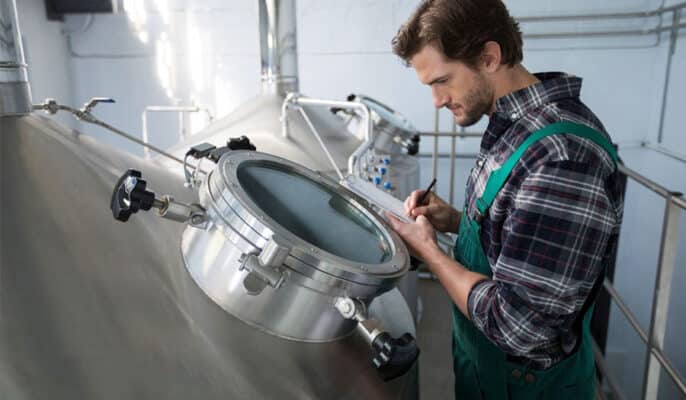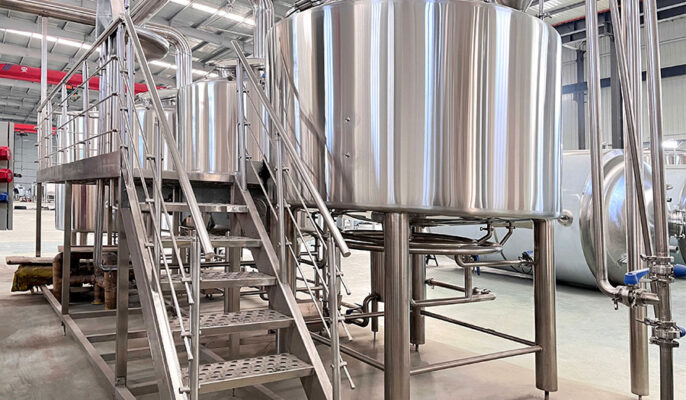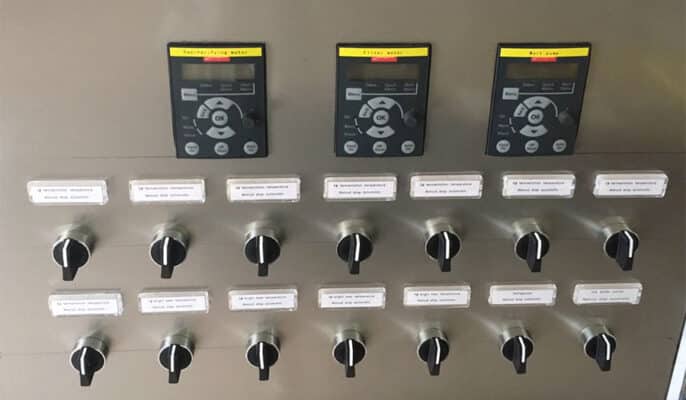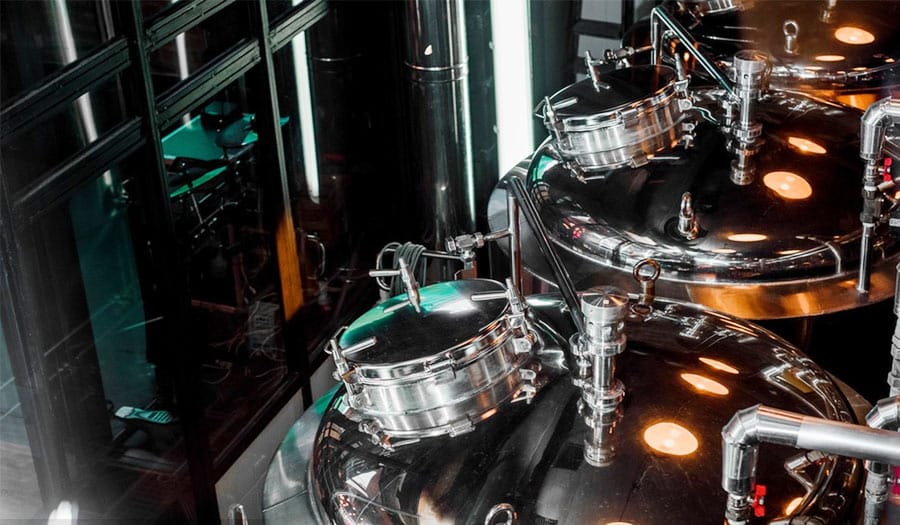In the highly competitive brewing market, malý pivovar have won wide favor with their unique brewing processes and innovative flavors. However, as market demand grows, these small breweries face a series of challenges. Although traditional manual and simple equipment provides support for the individuality and traditional craftsmanship of brewery, there are obvious deficiencies in efficiency and consistency. The introduction of automation technology is providing these small brewery with a set of solutions designed to help them improve productivity and reduce operating costs through production processes, precise and efficient quality control, and standardized data analysis.
Co je automatický systém vaření piva?
Automated brewing refers to the use of automation technology to control and manage all aspects of the beer brewing process, thereby improving production efficiency, ensuring product quality consistency, and reducing human intervention. The automated brewing system integrates advanced technical equipment and information systems to make the brewing process more precise, stable, and efficient.
The brewing process requires a delicate balance of raw materials, time, and conditions. Even the slightest deviation can affect the flavor, aroma, and quality of the beer. Automated systems eliminate most of the guesswork in the brewing process, allowing brewers to achieve consistent results every time. This consistency is critical for commercial brewers who need every batch of beer to meet customer expectations. For home brewers, it means more successful experiments and less waste of raw materials.

Automation technology in small brewery
Automation technology in small breweries can greatly improve production efficiency, ensure product quality, and reduce manpower requirements. Here are some common automation technologies and applications:
- Raw material handling automation: Automated conveyor belts and pump systems can transport raw materials such as malt and hops from the storage area to the production line, reducing manual handling. Use sensors and control systems to accurately batch ingredients to ensure the consistency of ingredients in each batch.
- Brewing process automation: Automated temperature control systems and pressure sensors can accurately control key processes such as malt mashand boiling. During mash and fermentation, automatic stirring systems can maintain uniform mixing and optimize reaction effects.
- Fermentation automation: Use sensors to monitor the temperature, pH value, and gas concentration in the fermentation tank in real-time, and automatically adjust to maintain ideal fermentation conditions.
- Filling and packaging automation: Automated filling machines can efficiently fill beer into bottles, cans, or barrels, ensuring accurate metering and reducing waste. Automated packaging systems can handle tasks such as labeling and boxing to improve the overall efficiency of the production line.
- Cleaning and disinfection: After the production process is completed, the automatic cleaning system can thoroughly clean and disinfect the brewing equipment to ensure that the next batch of products is not contaminated.
- Data acquisition and analysis: The integrated data acquisition system can monitor various indicators in the production process in real-time and provide production optimization suggestions through data analysis. The automated quality inspection system can quickly and accurately detect the quality parameters of beer, such as alcohol content, color, foam stability, etc.
What automatizované zařízení pro vaření piva does a small brewery need?
- Automated malt mash system: Mix malt with hot water and extract fermentable sugars from malt by controlling temperature and time. This process is a key step in beer brewing because it determines the sugar content and final alcohol content of the beer.
- Automated boiling system: Boil the mash liquid and add hops to extract bitterness and aroma. Equipped with automatic temperature control and stirring devices to ensure consistent flavor.
- Automatický fermentační nádrž: The fermentation tank is the core equipment for beer fermentation. It ensures that yeast works in the best environment by controlling temperature, pressure, and fermentation conditions, thereby producing stable alcohol and flavor.
- Automatic cleaning system: The CIP system is used to automatically clean and disinfect brewing equipment, avoid the tediousness of manual cleaning, and ensure that the equipment is in a sanitary state before each production.
- Automatický plnicí stroj: The automated filling machine is responsible for accurately filling beer into bottles, cans, or barrels, ensuring a consistent amount of beer in each container, reducing manual operations, and improving production efficiency.
- Automatic packaging system: The automatic packaging system is used to carry out the final packaging processing of the filled beer, including labeling, sealing, and boxing.

Advantages and Disadvantages of Automated Brewing Systems
Advantages of automatic brewing systems
The main advantage of an automated brewing system is its ability to produce consistent quality beer batch after batch. Not only does this automation significantly reduce the risk of human error, it is critical to ensuring the consistent flavor and quality of the beer. The system also saves time and effort, allowing winemakers to devote more energy to other businesses or hobbies. In addition, automation improves production efficiency and reduces raw material waste, which may effectively reduce production costs over time.
Disadvantages of automatic brewing systems
However, there are some disadvantages to automatic brewing systems. The initial investment cost is high, especially for advanced commercial and industrial equipment, which can be a hindrance for small breweries or homebrewers. While automation reduces the need for manual labor, operating and maintaining these systems still requires a certain level of technical expertise. Additionally, some winemakers believe that automating the process could take away from the artisanal artistry of brewing, the hands-on fun that is an important part of the brewing process for many.
Why do small breweries need automation systems?
Konzistence
It can be a challenge for small breweries to keep taste, quality, and standards consistent from batch to batch. Automation ensures that every step of the brewing process is precisely controlled, minimizing human error and variability. This results in a consistent product, which is essential to building and maintaining customer trust and satisfaction.
Efektivita a produktivita
Automation streamlines the brewing process, reducing the time and labor required to make each batch of beer. This allows small breweries to increase production without significantly increasing costs. Automated systems can handle repetitive tasks, allowing brewers to focus on more creative and value-added activities.
Data Collection and Analysis
Automated systems provide real-time data collection and analysis, providing valuable insights into the brewing process. Small breweries can monitor key parameters such as temperature, pressure, and flow rate to quickly adjust and improve. This data-driven approach can enhance quality control and process optimization.
How to choose an automation system supplier?
- Technical capabilities and experience: Choose suppliers with rich experience and technical capabilities. They should have expertise and successful cases in the corresponding industry.
- Equipment compatibility: Ensure that the supplier’s system is compatible with existing production lines and equipment to avoid additional costs and adjustments caused by incompatibility.
- Customer support and service: The supplier should provide reliable after-sales service and technical support, including installation, training, and maintenance, to ensure long-term stable operation of the system.
- System customization capabilities: Choose suppliers that can provide customized solutions according to specific needs to meet special requirements in the production process.
- User feedback and reputation: Check the feedback and evaluation of other customers to understand the reputation and product performance of the supplier.
- Cost and budget: Evaluate the total cost of the equipment, including initial investment, maintenance costs, and operating costs, to ensure the best value within the budget.
- Innovation and upgrade: Choose suppliers who can provide technology updates and system upgrades to adapt to future production needs and technological advances.

ČASTO KLADENÉ DOTAZY
How can automated systems improve production efficiency?
Automated systems reduce manual operation time and human error by precisely controlling every aspect of the brewing process. Automated equipment can continuously and quickly complete production tasks, such as automatic feeding, temperature control, mixing, and filling, significantly improving production speed and efficiency.
What is the initial investment required to implement an automated system?
The amount of the initial investment depends on the size and complexity of the system. Automation systems for small breweries can require an investment of tens to hundreds of thousands of dollars, including equipment purchase, installation, and commissioning costs. Although the initial cost is higher, cost recovery and savings can be achieved in the long term by improving production efficiency and reducing labor costs.
Is maintenance and troubleshooting of automation systems complicated?
Maintenance and troubleshooting of automated systems may require some technical knowledge, but most suppliers will provide detailed operating manuals and training. In addition, many suppliers offer after-sales service and technical support to help troubleshoot potential problems and perform maintenance.
What impact do automated systems have on the flavor and quality of the winemaking process?
The automated system maintains consistent beer flavor and quality by precisely controlling temperature, time, and raw material ratios. However, attention needs to be paid to system setup and maintenance to ensure the flavor and quality of the beer are not compromised. Automation can also help reduce human error and further ensure product stability.




